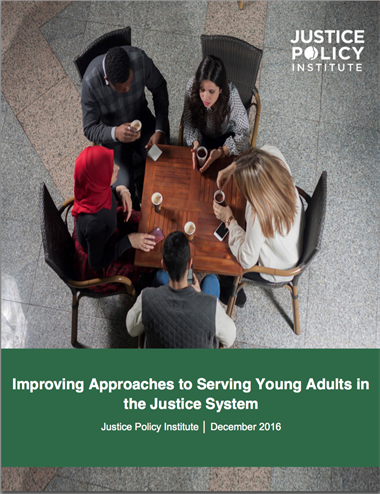
Together with the number of young adults in prison, roughly 1 in 5 people incarcerated in America’s prisons and jails are between the ages of 18 and 24 – about half of whom are young people of color.
The topic is critical to criminal justice reform efforts because young adults are overrepresented in the justice system, including the nations’ prisons and jails. The data show that while 18 to 24-year-olds are only 9.9 percent of the United States population, and they are 12% of the prison population. Among a sampling of eight cities and counties, young adults were 8.4 percent of the population, but were 25 percent of the jail population in these communities, 72 percent of whom were young adults of color. In these eight communities, taxpayers spend $163 a day to jail someone (upwards of $58,000 per year). In sharp contrast to the costs of jailing a young adult, a community-based approach to meeting the needs of young adults will cost less than what taxpayers spend to jail 18-24-year olds.
Over the past year, a number of different advocates, policy-makers, practitioners, funders, and directly impacted individuals and families in criminal justice policy have attempted to flesh out what a more effective approach might look like to serving 18-24 year olds who are currently under the custody of the adult justice system. To help advance thinking around this policy question, the Justice Policy Institute (JPI) convened close to four dozen people from ten states in two structured focus groups on the East and West Coast to discuss the opportunities, and the challenges in developing a better approach to meeting the needs of justice involved 18-24 year olds. A diverse spectrum of people that included law enforcement, juvenile and adult corrections leaders, academics, community-based organizations that serve young adults, and people who identify as formerly incarcerated young people had an opportunity to engage in a robust dialogue with each other.
DOCUMENTS
- Improving Approaches to Serving Young Adults in the Justice System (December, 2016): Full Report
- Improving Approaches to Serving Young Adults in the Justice System (December, 2016): Summary
- Fact Sheet: The Youth Rehabilitation Act and Depictions of Its Use in D.C.’s Justice System
MEDIA
- “A Focus on Young Adults Will Help Create Safer Communities and Reduce the Use of Incarceration” by Marc Schindler, The Huffington Post, 12/7/2016
- “Harnessing data and information can lead to a better youth justice system” by Marc Schindler, The Hill, 12/14/2016
- “Draw From Juvenile Justice System’s Strengths for Better Approaches for Young Adults” by Marc Schindler, Juvenile Justice Information Exchange, 12/14/2016
- Help spread the word about our new report and convince our policymakers to start rethinking how we approach #YoungAdultJustice! Join the conversation by using the report hashtag, and sending your own posts from our social media toolkit.
- West Baltimore offers vivid reminder of failed mass incarceration policy
- Juvenile Justice Initiative, Illinois (February, 2015)
- Danielle Sered, Director, Common Justice, Vera Institute of Justice (July, 2016)
- (Council of State Goverments, December, 2015)
- National Institute of Justice (June, 2016)
- (December, 2016)